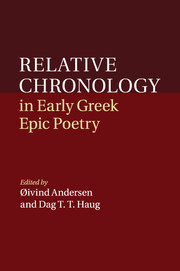Book contents
- Frontmatter
- Contents
- Notes on contributors
- Preface
- Abbreviations
- Introduction
- Chapter 1 πρῶτόν τε καὶ ὕστατον αἰὲν ἀείδειν
- Chapter 2 Relative chronology and an ‘Aeolic phase’ of epic
- Chapter 3 The other view
- Chapter 4 Late features in the speeches of the Iliad
- Chapter 5 Tmesis in the epic tradition
- Chapter 6 The Doloneia revisited
- Chapter 7 Odyssean stratigraphy
- Chapter 8 Older heroes and earlier poems
- Chapter 9 The Catalogue of Women within the Greek epic tradition
- Chapter 10 Intertextuality without text in early Greek epic
- Chapter 11 Perspectives on neoanalysis from the archaic hymns to Demeter
- Chapter 12 The relative chronology of the Homeric Catalogue of Ships and of the lists of heroes and cities within the Catalogue
- Chapter 13 Towards a chronology of early Greek epic
- Bibliography
- General index
- Index locorum
Chapter 13 - Towards a chronology of early Greek epic
Published online by Cambridge University Press: 05 January 2012
- Frontmatter
- Contents
- Notes on contributors
- Preface
- Abbreviations
- Introduction
- Chapter 1 πρῶτόν τε καὶ ὕστατον αἰὲν ἀείδειν
- Chapter 2 Relative chronology and an ‘Aeolic phase’ of epic
- Chapter 3 The other view
- Chapter 4 Late features in the speeches of the Iliad
- Chapter 5 Tmesis in the epic tradition
- Chapter 6 The Doloneia revisited
- Chapter 7 Odyssean stratigraphy
- Chapter 8 Older heroes and earlier poems
- Chapter 9 The Catalogue of Women within the Greek epic tradition
- Chapter 10 Intertextuality without text in early Greek epic
- Chapter 11 Perspectives on neoanalysis from the archaic hymns to Demeter
- Chapter 12 The relative chronology of the Homeric Catalogue of Ships and of the lists of heroes and cities within the Catalogue
- Chapter 13 Towards a chronology of early Greek epic
- Bibliography
- General index
- Index locorum
Summary
The occasion of the 2006 Oslo conference prompted me to do something I had long had in mind: to make a synthesis of the views I have formed in the course of over forty years on the datings of various early Greek hexameter poems. The dating of the Iliad alone, or the Odyssey, or the Cyclic epics, or the Hymns, or the poems of Hesiod, would of course have afforded material enough for a conference paper. But there is much to be said, especially perhaps in the context of this collective enterprise, for attempting an overview and for proposing a comprehensive chronological framework. Naturally I cannot, within the set limits, review the history of scholarship on the question or engage at length with the work of others who have come to divergent conclusions. I cannot do much more than explain what I regard as the best criteria in these matters, and what conclusions I derive from them. If I make more reference to my own previous publications than to those of anyone else, it is not because I wish to pose as the supreme fountain-head of truth but because I am ex proposito drawing together and building on (or in some cases modifying) my earlier work and thoughts.
In attempting to establish a chronology for these poems we have to use a combination of relative and absolute criteria. We start with an overall time-frame. A hundred years ago scholars of repute were happy to put the Iliad and Odyssey in the tenth or ninth century. Nowadays I think almost everyone would want to put them somewhere between 750 and 600 (or at the very latest 520). We see the matter in sharper focus. We no longer think of Greek history as beginning with the first Olympiad in 776, with only a misty mythical era before it. Archaeology has given us a picture of the Mycenaean world and a general framework for the centuries between the collapse of the palaces and the flowering of the archaic polis. We have learned how to date some elements of the material culture described in the Homeric poems. We have built up a model of the stages by which the Greeks gained knowledge of foreign peoples and places, and we can measure the Homeric picture against it. We no longer imagine that the poems as we have them could have been preserved unchanged over time without being fixed in writing, and we accordingly rule out a date of composition earlier than we believe a written text was likely to exist. We no longer take it as an axiom that epic poems must be earlier than lyric or iambic or elegiac poems.
- Type
- Chapter
- Information
- Relative Chronology in Early Greek Epic Poetry , pp. 224 - 241Publisher: Cambridge University PressPrint publication year: 2011
- 24
- Cited by



